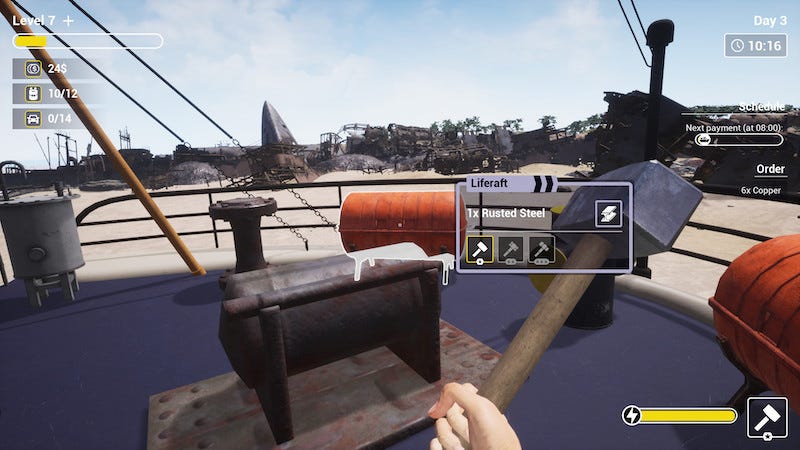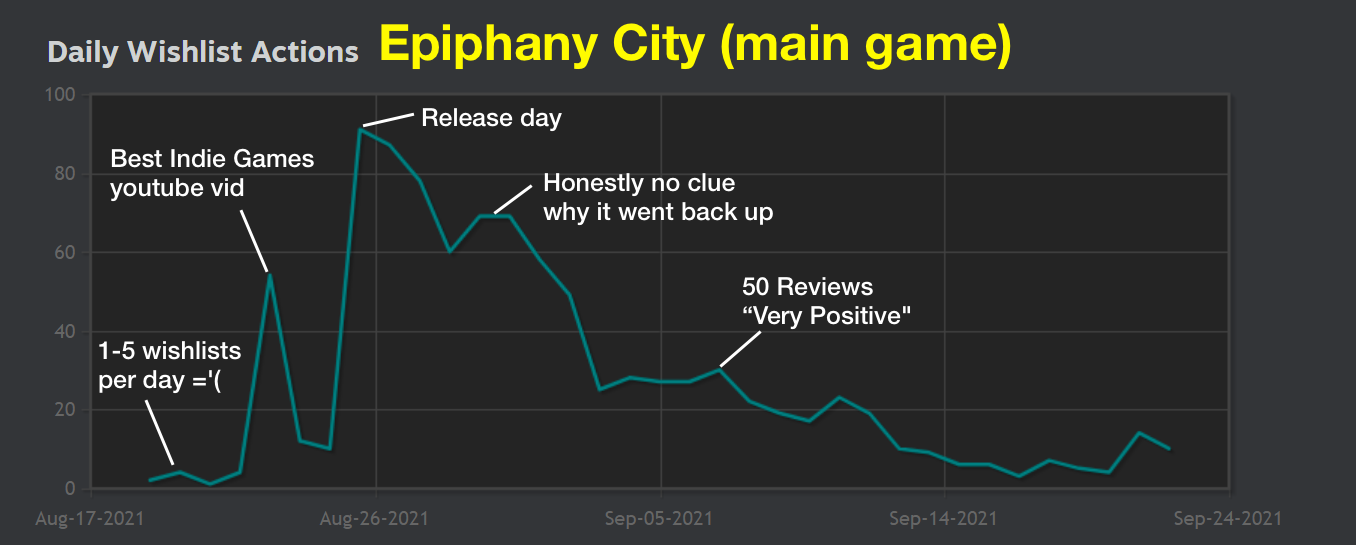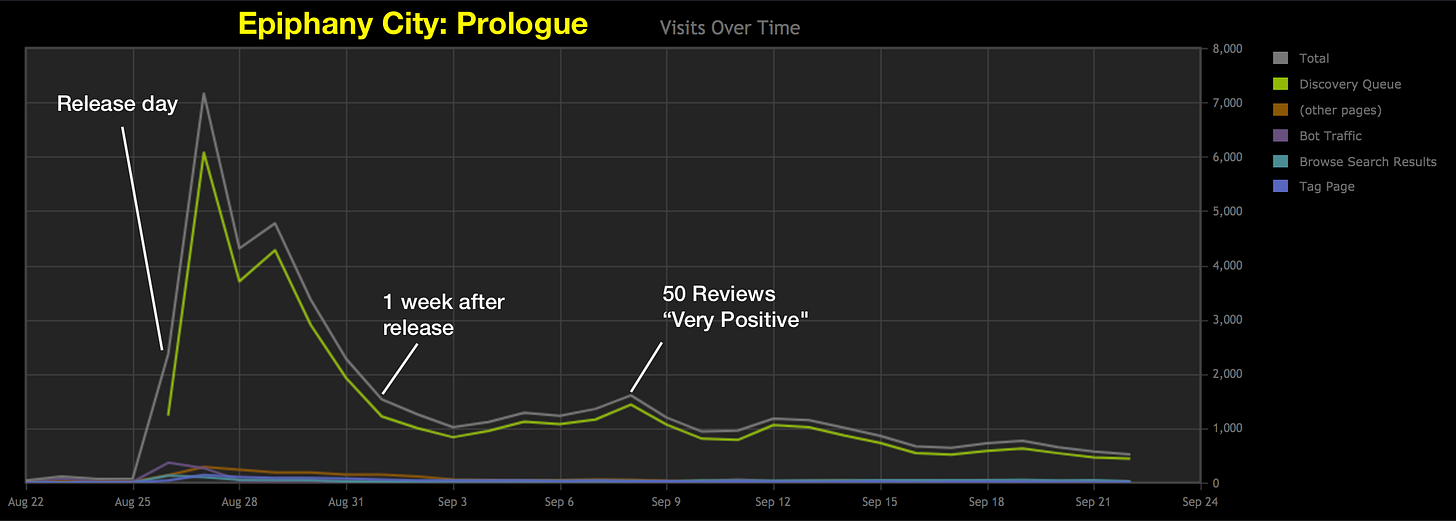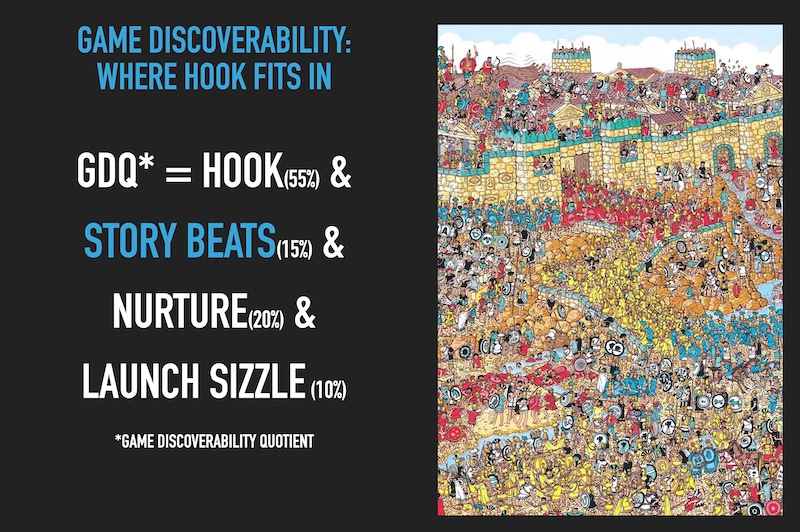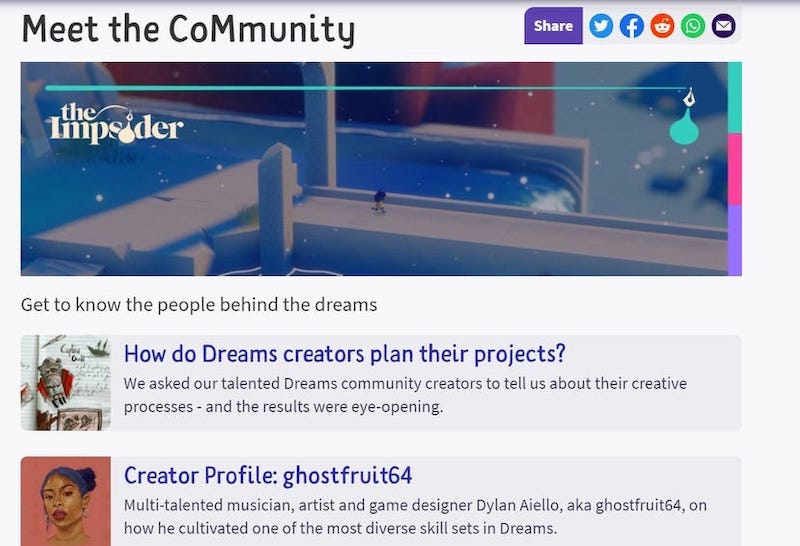Revisiting the Steam Prologue as a 'discovery beat'
Publikováno: 13.10.2021
It can be handy, but it's one of many!
[The GameDiscoverCo game discovery newsletter is written by ‘how people find your game’ expert & GameDiscoverCo founder Simon Carless, and is a regular look at how people discover and buy video games in the 2020s.]
And it’s Wednesday, so it must be the second free GameDiscoverCo newsletter of the week! Next up after this, we’ll be doing some paid subscriber-exclusive analysis of the (increasingly busy!) Steam, Switch, and EGS charts and debuts on Friday.
But in the meantime, we have a lot to talk about. And we’re going to start with another look at the Steam Prologue concept - and an attempt to take it from a specific ‘you must/mustn’t do this’ recommendation to a larger musing on creating ‘story beats’ for your game.
[REMINDER: in honor of the ‘Spelunky’ eBook, only two days left to get the 20% off deal for our GameDiscoverCo Plus paid subscription, with exclusive newsletters, an info-filled Discord, a data-exportable back-end for Steam ‘hype’, two eBooks, & lots more.]
Steam Prologues - success stories & a wider view?
Those who have been subscribed to this newsletter for a while may recall our January piece on Steam Prologues - those ‘separate Steam apps which showcase a standalone early demo of your game.’ In it, we looked at data to try to work out if they were effective.
To some extent, we concluded there was a correlation/causation issue at play. In other words, popular Prologues often come from games that were likely to be popular anyhow. But you take additional publicity where you can get it. And in the wake of Ship Graveyard Simulator’s Prologue (above) racking up 100,000 players in less than a week, we thought it would be good to revisit the whole subject.
It’s clear that Steam as a platform is a little puzzled by the Prologue trend - though they don’t forbid it as long as you don’t bill Prologues as ‘demos’. But in recent months, devs have moved more strongly towards the ‘demo on your regular store page’ route. This is more enthusiastically endorsed by Steam - particularly via Next Fests, which Valve has released concrete and positive data for.
A positive Prologue example: Epiphany City
However, there are still great examples of Prologues boosting visibility for games, and GameDiscoverCo subscriber David Elliot passed along the Reddit post he did about the Epiphany City Prologue his team recently launched.
Epiphany City is “a creative puzzle game where you use magical picture frames to manipulate the world”, and he notes as an introduction that the game is “a short puzzle-adventure game with cutesy graphics (not pixel art), so it's not a game that typically does well on Steam. Our organic daily wishlist rate confirms this, as we average only 1-3 wishlist additions per day.”
And you can see the result of the Prologue launch on the main game’s wishlists above - a pretty good one. He explains: “The main game gained 866 wishlists over 1 month (this does account for deletions) and our newsletter gained 179 subscribers. This was fantastic, and by far the best part of the Prologue's release. Our wishlist rate stayed much higher than normal (10-30 wishlist additions) for at least 30 days after.”
David also shared the Steam traffic over time on the Prologue, since it has its on Steam page, and it’s pretty reasonable, espetcially from the Discovery Queue. (The Prologue itself has 69 Very Positive reviews.)
Also, with these Prologues and demos, you want to keep an eye on how many people actually played the game. For example, David notes: “10,302 people added the game to their Library, but only 1,455 people actually started up the game.”
A holistic view of Prologue releases?
If we step back, I thought a better way to view a Prologue release is as a ‘Story Beat’ - a major announcement on the road to releasing your game. The above graphic is shorthand that GameDiscoverCo sometimes uses in presentations, as a way to think about how you break through the mass of games.
It’s fairly self-explanatory: we think your game’s ‘hook’ is key. But we also value ‘Story Beats’ - the four or five major announcements you make throughout the 12-18 months before you release a game, as well as ‘Nurturing’ your player base via Discord and community, and getting your ‘Launch Sizzle’ on point with streamer outreach & more.
And if you look at what Epiphany City did in publicizing their Prologue release, it has all the hallmarks of a major announcement ‘Story Beat’. For example, they did a successful Imgur post, posted on Reddit and Twitter, and even got featured by a YouTube channel, Best Indie Games, all timed around the release of the Prologue. So.. extra marketing for discovery!
Therefore, maybe it’s best to look at it like this. Yyou only have a limited amount of times you can make a major splash. For your game, perhaps your ‘Story Beats’ could be:
Announcement with gameplay trailer (all games, please do this?)
Open Beta or Prologue (tho maybe this isn’t an either/or?)
Next Fest appearance (don’t see why you wouldn’t?)
Release date announcement (these can be powerful - see Let’s Build A Zoo just now!)
Game is out now! (everyone has one of these!)
At this point, the discussion becomes a little less binary. It’s not ‘Prologues are great - yes/no?’, it’s more ‘you have a limited amount of times to get everyone’s attention with bigger announcements - weigh up the pluses and minuses of Prologues being one.’ Which is a different lens on the problem.
And this specific question was addressed by Epiphany City in a reply to a comment which was basically ‘why not just release this as a demo?’ The dev’s point of view: “Pro: Your game gets additional visibility from Steam algorithm when you release a game (not a lot tho); People can leave reviews; A free game might be easier to search for than a demo. Con: You might confuse traffic between the Prologue and the main game; If reviews are bad people might be less likely to play the full game?" So as you can see - it’s complex.
Indie games in China: a deeper view
While I’ve been talking about the phenomenon of culturally Chinese games succeeding on Steam for a while now, I don’t really have the perspective of somebody who - say - lives in China or speaks Mandarin, and is immersed in the culture.
Which is why I’m so excited that the Chaoyang Trap newsletter - “about everyday life on the Chinese internet” - is tackling the success of Chinese-created games on Steam, in the first part of a two-part long form newsletter series on games.
It starts with insights like this: “Unlike seemingly any other kind of art or culture from China, Chinese video games have been given the space to be video games first and Chinese second.While it feels like every Chinese movie or novel is forced into a dichotomy of being either a brave dissident statement or symbol of China’s unstoppable rise, both players and games media have mostly reacted to Chinese games on their own terms.”
And they note on the flowering of this ‘scene’: “An entire Steam-focused ecosystem has sprouted across Chinese social media in response to the platform’s new prominence: Official Accounts (公众号) reposting Western game news on WeChat, users spouting off about over- or underrated games on Zhihu, hours-long game critiques on Bilibili, guides to female friendly games on Xiaohongshu.”
There are also certain genres that are better explained by locals: “Many are RPGs or management sims based in xianxia, the uniquely Chinese fantasy genre, and centered around the idea of “cultivation” (修仙, xiu xian. Put very simply, raising yourself from a mortal into an immortal).” Oh, so that’s why the Rimworld-y Amazing Cultivation Simulator is so resonant…
Also interesting to see Chinese indie game booster Zhu Jingtong come to a similar conclusion to us on Steam’s surprising continued presence in China: “No one knows whether or not it's going to be blocked, because blocks are usually triggered by some kind of event. So unless that event is important enough for the authorities to notice, I don't think the current situation is going to change anytime soon.” Anyhow, it’s a must read.
The game discovery news round-up..
OK, finishing up this week’s game discovery news in style, thanks to a whole bunch of news streaming out of the space. And it’ll be streaming from the space into your head starting… now:
In the latest ‘Epic vs. platforms’ move, Google “has countersued Epic Games, accusing the games developer of breaching its contract when it introduced a new payment system to sidestep the Play Store's payment systems and in-app purchase commissions.” Given that Apple won this part of its lawsuit, and discovery revealed Epic’s plan re: Google’s Android Play Store was: ““[i]f we are rejected for only offering Epic’s payment solution. The battle begins. It’s going to be fun!”? We think Google might have a case on this specificity…
More ‘TikTok is awesome for game discovery’ fodder via Thomas Reisenegger of Future Friends: “Numbers from a recent Exo One TikTok: ~1 million organic views ~143,000 likes ~2,000 comments ~1,400 DM shares + Over 3,000 Wishlists (comparable to latest Steam Fest). Can’t overstate how much organic potential TikTok has compared to most social media for indies at the moment.”
Large-scale community curation (above) for ‘make your own game / experience’ platforms like Media Molecule’s Dreams is complicated. So it’s great to see MM’s Jen Simpkins explaining it in a recent interview. Some interesting stuff in here: “We'd like to help more creators monetize through our commercial beta program, but we're also thinking very seriously about how we can allow creators to be supported more directly in a way that makes sense for Dreams and the creative ecosystem...”
Microlinks: in case you missed it, Chris Zukowski’s GDC 2021 talk on 30 minute Steam page makeovers is up on YouTube; interesting Protocol piece on how the battle royale is fading out as a genre; Die Gute Fabrik (Mutazione) has a standout piece about shifting to a 4-day week which all of you should consider.
Not a ‘video games’ piece, but very much aligning with my views - over at SparkToro, Rand Fishkin makes the argument: “What if performance advertising is just an analytics scam?” And while the word ‘scam’ is deliberately provocative, the idea that a lot of ad networks are just ‘collecting attribution’ for something that might have happened anyway is… not to be overlooked?
There’s a new Valve video Q&A - starring Alden Kroll and Eric Peterson - over at GI.biz, originally part of their in-person event a few days back, and it’s billed as: “developers can ask about releasing their games on Steam, how Steam works, and even the new Steam Deck.” (You can’t ask now, but you can see what other people asked - and Valve’s responses!)
Microlinks Pt.2: it’s been five years since PlayStation VR launched, and Sony shows top hits & promises 3x free games to celebrate; time spent playing video games is unlikely to impact your well-being (in either direction? lol); AR headset Magic Leap has raised another $500 million, in case you’re wondering how frothy the markets are right now.
The ‘slow and careful return’ of in-person events is being documented by the Game Conference Guide newsletter, with some interesting comments and case studies by actual game event organizers. Guy Blomberg (GIG) on the new irl vibe: “What's most interesting is just how much people are more aware of each other… People were very obvious to check before doing things that would have been standard before - ‘Can I give you a hug?’ ‘Can I shake your hand?’ and even ‘Did you want me to wear a mask while we chat?’”
Microlinks Pt. 3: good Q&A on post-pandemic investment and the ‘internationalization of funds’ during said pandemic; maybe the restrictions on youth gaming in China aren’t such a big deal, even if other parts of the government crackdown are; a postmortem of an Alexa voice game reveals paid game discovery is rough for that platform.
Finally, with the sumptuous Windows 11 launch ads offering glimpses of Xbox Game Pass titles like Halo Infinite and Psychonauts 2 in them, we decided to look back at Microsoft’s history of crosspromoting its OS and video games.
And we came up with this. Yes, the Xbox ‘Duke’ controller is the security officer in this transcendental Office XP ad starring Gilbert Gottfried as Microsoft’s much-derided Clippy. We have no idea what’s going on, but we love it:
[We’re GameDiscoverCo, a new agency based around one simple issue: how do players find, buy and enjoy your premium PC or console game? We run the newsletter you’re reading, and provide consulting services for publishers, funds, and other smart game industry folks.]
